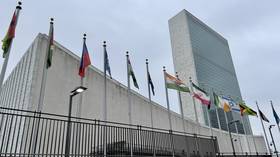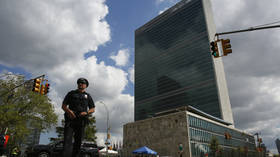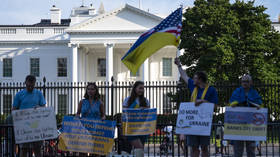Russia wants UN to pressure US – media

Russia’s permanent representative at the United Nations, Vassily Nebenzia, has asked the organization to persuade the US to grant visas for members of Moscow’s delegation to the UN General Assembly. They are heading to New York to attend the high-level general debate that will be held between September 20 and 26.
The request was made in a letter that Nebenzia forwarded to UN Secretary-General Antonio Guterres on Friday. The document has been seen by both Russian and the Western media.
In his message, the envoy pointed out that, with less than three weeks remaining before the General Assembly, not a single member of Russia’s delegation has received entry visas from the US. The Russian side, headed by Foreign Minister Sergey Lavrov, had submitted the relevant applications to attend the event to the American embassy in Moscow, the diplomat reportedly added.
“This is even more alarming since, for the last several months, the authorities of the US have been constantly refusing to grant entry visas to a number of Russian delegates assigned to take part in the official United Nations events,” the letter read, as quoted by the media.
Earlier this week, Nebenzia pointed out that Russian Interior Minister Vladimir Kolokoltsev and his delegation could not attend a meeting of UN police chiefs because the US refused to grant them visas.
The Russian envoy cited the 1947 agreement between the UN and the US, which states that “visas shall be granted without charge and as promptly as possible… irrespective of the relations existing between the governments of the persons referred to… and the government of the US.”
The already strained relations between Moscow and Washington have deteriorated even further since the launch of the Russian military operation in Ukraine. The US has slapped harsh economic sanctions on Russia while backing Kiev and providing it with billions of dollars in military aid, as well as with intelligence.
Nebenzia urged Guterres “to once again emphasize to the authorities of the US that they must promptly issue requested visas for all Russian delegates and accompanying persons,” including the Russian journalists covering Lavrov’s trip to the General Assembly.
A spokesperson for the US mission to the UN, who wasn’t authorized to be quoted by name, assured AP that the US was taking its host country obligations seriously.
“To ensure timely processing, we repeatedly remind the Russian mission to the UN, as we do all other UN missions, that the US needs applications as early as possible,” the spokesperson said.
The US mission representative linked the delays in visas for Moscow’s delegation to “Russia’s unwarranted actions against our embassy in Russia, including the forced termination of local and third country national staff, which have severely limited our staffing and therefore our capacity to process visas.” Those measures had been introduced by Moscow in response to similar moves by Washington.
When asked to comment on Nebenzia’s letter, UN spokesperson Florencia Soto Nino-Martinez said the organization remains in close contact with the US on the issues of visas for foreign delegations. “We are doing so in this case,” she confirmed.














